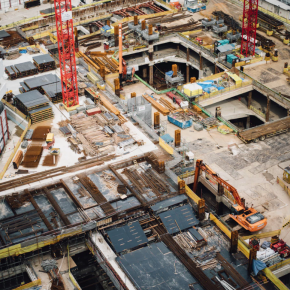
Filtering the environment
Richard Betts from Rabscreen discusses the effect that the disposal of air filters to landfill is having on the environment and suggests that re-usable filters may offer the only real long-term solution, in the latest issue of ABC&D magazine.
Air handling units use many disposable filters depending upon the application and standards required for the final air supply. Proper disposal of the old filters is essential to prevent all the collected debris from becoming airborne once again. Remember that a well-used filter might have 30 to 90 days of trapped material in it, so many irritants, allergens and other particles have the potential to become airborne again.
Rising demand for energy efficient and better performing air filtration technologies is anticipated to catapult the European industrial air filtration market growth over the next few years. This demand is driven by an increasing end-user preference towards eco-friendly air filters that minimise health hazards. Manufacturers are widely developing energy-efficient air filters, such as rigid cells filters, pleated filters and pocket filters with enhanced efficiency and straightforward installation requirements.
HEPA filters are anticipated to reach the significant revenue share of over 24% by 2022 growing at a compound annual rate of over 8% from 2014 to 2022. This growth is attributed to the capability of HEPA filters to dispose all toxins and other harmful substances from the environment. They can easily eliminate pet dander, pollens, and dust particles from the air driving the Europe industrial air filtration market.
One of the major factors responsible for a significant amount of greenhouse gas (GHG) emissions worldwide is the high percentage of electricity consumed by residential and commercial buildings. For instance, in the US, residential and commercial building consume approximately 70% of overall electricity use, while generating around 40% greenhouse gas emissions. One-third of the energy consumed by commercial buildings comes from either ventilation and space heating or cooling applications of HVAC systems.
As a result, the trend of reducing energy consumption has been rapidly gaining traction amoung end-users. To cut a motor’s energy consumption, the fan motor in HVAC systems has to overcome resistance to deliver the required air flow, compelling the manufacturers to focus on the development of air filters that offer lower resistance to air flow.
Recycling, on the other hand, is a problem. Okay, the frames may be constructed using a simple cardboard material, but the filter itself? That’s not quite so easy to recycle. Depending on the type of filters you buy, they could be composed of anything from fibreglass to plastic to wire mesh, or even a combination. This material, therefore, makes them inappropriate choices for standard recycling and the majority will end up in the trade waste skip for landfill.
The demand for air filters is increasing which also increases the environmental impact of their disposal. “While air filters benefit building occupants’ health and protect HVAC equipment, we have to replace the old ones with clean ones on a continuous basis,” said Reitmeier CEO, Jeff Nusz. “Few people realize the negative impact the used filters have on the environment. When we dispose of these filters in our landfill, it leads to harmful greenhouse gasses and carbon dioxide.”
16,000 standard 24 x 24 air filters would fill seven commercial shipping containers weighing in at 11 tonnes with a volume equivalent to 1⁄2 million, one-pint plastic bottles.
Is there a solution? One that not many people are aware of, but indeed should be.
You can invest in reusable rather than disposable filters – a short-term investment for significant and well-worthwhile long-term financial and environmental gain. Protecting existing disposable filters with a reusable pre-filter will extend their life by up to 60%. Fewer filter changes, less money and less environmental impact.
Latest news

21st February 2025
ASSA ABLOY EMEIA: Save valuable time and money with a seamless switch to programmable digital keys
In 2025, access management can be a whole lot easier. By making access part of their digital processes, businesses can put time-consuming key management and the cost of changing the locks firmly behind them. Making this switch is a lot easier than many people think, as ASSA ABLOY explains here…
Posted in Access Control & Door Entry Systems, Architectural Ironmongery, Articles, Building Industry News, Building Products & Structures, Building Services, Doors, Facility Management & Building Services, Health & Safety, Information Technology, Innovations & New Products, Retrofit & Renovation, Security and Fire Protection
21st February 2025
Showersave supports industry leaders in addressing Part L and Part G regulations
Showersave has sponsored and participated in a recent Building Insights LIVE roundtable on ‘Water & Energy Saving Innovations in New Build Housing’.
Posted in Articles, Bathrooms & Toilets, Bathrooms, Bedrooms & Washrooms, Building Associations & Institutes, Building Industry Events, Building Industry News, Building Products & Structures, Building Regulations & Accreditations, Building Services, Exhibitions and Conferences, Interiors, Pipes & Fittings, Plumbing, Retrofit & Renovation, Sustainability & Energy Efficiency
21st February 2025
GEZE: The importance of Specifying High Quality Door Closers on Fire Doors
Andy Howland, Sales & Marketing Director at GEZE UK, discusses why specifying high quality door closers on fire doors is important…
Posted in Access Control & Door Entry Systems, Accessibility, Architectural Ironmongery, Articles, Building Industry News, Building Products & Structures, Building Regulations & Accreditations, Building Services, Doors, Facility Management & Building Services, Health & Safety, Posts, Restoration & Refurbishment, Retrofit & Renovation, Security and Fire Protection
21st February 2025
Insight Data achieves ISO9001 recertification with zero non-conformities
Leading industry data specialist, Insight Data, has successfully achieved the prestigious recertification for ISO9001 with zero non-conformities for the fourth consecutive year.
Posted in Articles, Building Industry News, Building Regulations & Accreditations, Building Services, Information Technology, Research & Materials Testing
 Sign up:
Sign up: